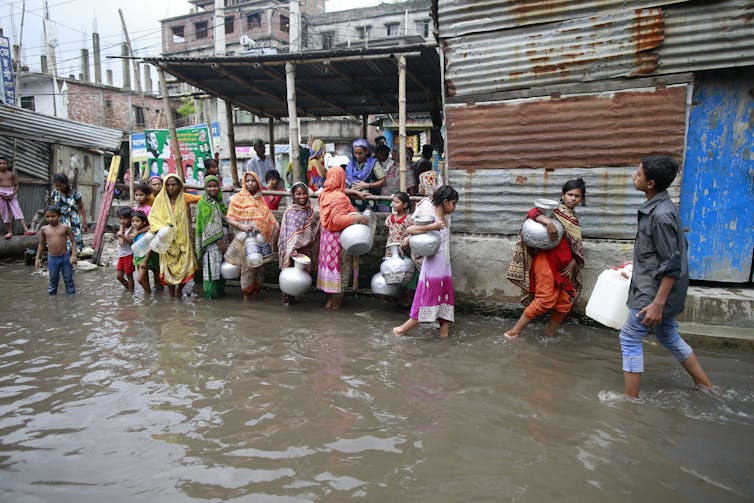 |
| COP24 plenary. Image credit Wikimedia Commons Doman84. |
The topic of climate change has fascinated me ever since the age of 17 and I haven’t looked back since then because it is something that is beyond my passion. I completed my Bachelors in Environmental Science at the University of Nottingham and now here at the University of Bristol I am enrolled in Climate Change Science and Policy MSc.
I am also part of a youth-based Climate Change NGO, Malaysian Youth Delegation (MYD), which constantly pushes for more ambitious national and regional climate policies and liaises with the government. The organisation also represents youth climate movement on national and International platforms, educates Malaysian Youth on UNFCCC in relation to Malaysian climate policies and holds Malaysian leaders accountable for their promises. Being in the organisation has taught me about the intricacies involved in climate policies such as the global north-south divide, climate adaptation, mitigation, finance and capacity building.
Being at the University of Bristol has made me intrigued to know more about the science-policy interface that occurs in climate negotiations like COP. I was also intrigued to find out more about how negotiations took place and the role of politics being part and a consequence. I am thankful for Cabot Institute for assisting and funding me with the logistics to my trip to Katowice. During my time at COP24 and aside from tracking negotiations, I was predominantly taking the youth narrative and was working with the organisation I represented – the Malaysian Youth Delegation (MYD) and Youth NGO constituency (YOUNGO).
My experience at COP24 was a profound one, primarily because I saw the subject of climate change coming to life through the form of formal and informal negotiations, high-level meetings and other side events in the premises. This COP was an important one since the draft text for the Paris Agreement Working Programme was supposed to be completed by the end of the conference – the document is vital for the implementation of the Paris Accord that took place in 2015. The two weeks that I’d spent at the COP were some of the most exhilarating and engrossing adventures in the world of climate policy – days often started at 6 am and completed around 2 to 3am the next day leaving a short time to rest each day. At the conference, I attended and observed negotiation sessions, youth constituency meetings, side events related to other aspects of climate change during the day and helped to produce position papers, proposals and write reports for MYD and YOUNGO in the evenings and overnight.
Highlights
One of my main highlights was that I got the chance to meet the Malaysian Minister for Energy, Science, Technology, Environment and Climate Change, Ms. Yeo Bee Yin, and Dr. Gary Theseira, the special functions officer to the minister and a highly experienced negotiator in the UNFCCC. We, the MYD team, attempted to shadow the minister while she was at the conference. Unfortunately, we couldn’t follow the minister as many of her meetings were predominantly “closed door” meaning those meeting not being open to observers. However, the initial purpose of tracking the minister at the conference was to know her views on her unprecedented attendance of a climate conference and how she would take back any outcomes to Malaysia. We also had the opportunity to transcribe Ms. Yeo Bee Yin’s COP speech which can be read here.
Another highlight was having the opportunity to meet my tutor, Cabot Institute theme co-lead for Environmental Change research, Dr. Jo House, at the conference too. We visited the Polish “coal exhibition” center together where chunks of coal were stacked up. They were termed “clean coal” which were made to supposedly reduce the environmental impact of its combustion as compared to regular coal.
I was also presented with an opportunity to deliver an intervention (a term used in COPs where non-country stakeholders provide their expressions to the chair of a respective meeting) on behalf of YOUNGO. Due to time constraints and other internal reasons, this fell through but the position paper I was about to present was handed over as a written draft to the respective chair of the meeting.
The most important highlight of the conference was the production of the 133-page rulebook for the implementation of Paris Agreement, which was unanimously adopted at the conference. This contains the framework for the various articles and implementation modalities mentioned in the Paris Agreement.
The next COP will take place in Chile from 11-22 November 2019 with the pre-COP happening in Costa Rica at an earlier date. COP25 and the intersessional meetings before 2020 will make the rulebook less ambiguous to enact the Paris accord. The United Kingdom has also officially submitted a bid to the UNFCCC to host COP26. This conference would be crucial since it would be the first COP during the implementation period of the Paris agreement – the UK would have to successfully host nations and lead it to a productive outcome considering the interest of various parties.
The most deliberate question in our minds, as youth representatives, is that after the publication of the IPCC’s Special Report, will the Earth’s average surface temperature stay below 1.5C since pre-industrial levels?
————————
This blog is written by Varunkanth Muralikanth, a Climate Change Science and Policy masters student at the University of Bristol.
| Varunkanth Muralikanth |



